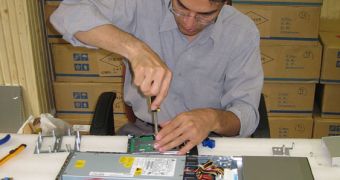An Iranian computer research center in Tehran claims to have built a supercomputer out of AMD's Opteron processors. This is alleged to be the Middle Eastern country's most powerful supercomputer. Many people would rush to congratulate the Iranians for the new technological achievement but there is a big "but" regarding this: the United States has imposed federal antiterrorism trade regulations that strictly prohibit the sale of any computer technology built in US or by US companies towards Iran.
It seems that rules are made to be broken and the Iranian High Performance Computing Research Center (IHPCRC) that is located at Tehran's Amirkabir University of Technology posted the announcement on their webpage. They are also giving further details about the project and say that they managed to assemble a Linux-based system with 216 Opteron processing cores, able to deliver peak performance level of 860 billion floating-point operations per second. According to the current achievements in the supercomputer world, this is quite a small supercomputer but the Center has announced that is the fastest built in Iran to date and will be used for meteorological research and weather forecasting.
Iranians have made other technological attempts in the past regardless of whether or not they were allowed to possess US technology. According to the same website, the researchers at Amirkabir University managed to put together a 32-node PC cluster based on Pentium III processors produced by US Intel Corporation and the following year they built an eight-node cluster using Pentium IV processors.
The technology is allegedly shifting to Iran from the United Arab Emirates, where one of the biggest AMD authorized distributors, Thacker/Sky Electronics, is located. When confronted, the company spokesperson denied having provided Iran with US technology and stated that "It is an embargo [situation] for us".
"The fact there is stuff going into Iran is certainly well known to U.S. regulators", said Christopher Wall, an international trade attorney in the Washington office of Pillsbury Winthrop Shaw Pittman LLP. He added that the UAE has been a country of interest to a U.S. government program designed to stop shipment from foreign countries to Iran.
The US export law also applies to foreign parties that are re-exporting U.S. products, but it is easy for these parties not to abide the law either voluntarily or not. The technological leakage is difficult to follow, since the vast majority of components may change hands many times until they are finally delivered to the final destination.

 14 DAY TRIAL //
14 DAY TRIAL //